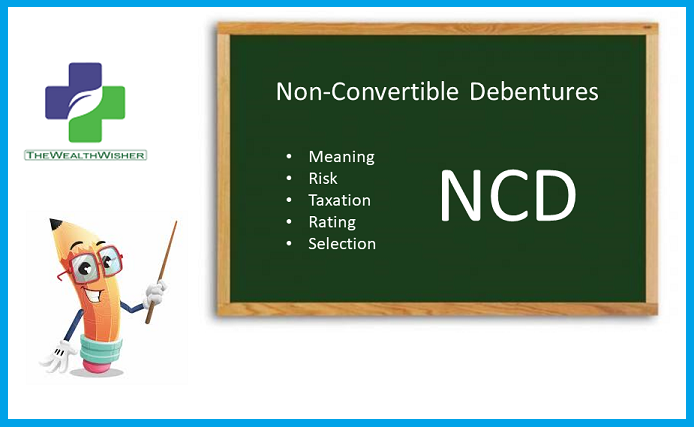With fixed Deposit rates going south, NCDs are instruments who carry higher rates than Bank FDs & even corporate FDs. So, what is NC or non-convertible debentures? Is NCD a good investment? Is there risk in investing in NCD? Can this risk be minimized? How should you select an NCD to invest? Here are the details.
Non-Convertible Debentures are long-term financial instruments like fixed deposits issued by a company for a specific tenure. The NCD carries a promise to pay fixed interest to the investor.
What is NCD or Non-Convertible Debentures?
Debentures are of two types, namely convertible debentures and non-convertible debentures (NCD).
Non-convertible debentures are those which cannot be converted into shares or equities. What is NCD interest rates – it depends on the company issuing the NCD. Once the tenure is over the principal is repaid back to the investor. There is also no option to renew NCD like FDs.
What is NCD investment – it can be held by individuals, HUFs, or in name of corporate bodies registered or incorporated in India. NRIs too can invest if the issuer takes permission from RBI for NRIs to invest.
What is NCD Dilemma
NCDs offer interest rates more than corporates or banks.
Hence it is a visible fact that fixed-rate investors or DEBT Category investors will get lured to invest. Who doesn’t want more!
But if a bank is offering 6%, why will someone give you 9% or 10%.
NCDs are issued by companies in need of funds. If the bank is taking FDs at 6%, it can offer loans to these cash needy companies at 8% or 9% and still can make 1-2%. Still, these companies are not taking loans at 8-9% from banks and taking deposit in form of NCD from the public at 9-10%.
Have you thought about this? Why?
Simple… The bank considers RISKY to lend or lend further to these companies. So the risk is bypassed to investors.
Risk in NCD Investing
Risk is always relative. Means for 2 people the same thing may have different risks.
Consider that you have 1 Cr in Fixed Income Securities to invest. You invest 100% in Bank FD or Government Securities at 6%. Your returns after one year will be 6%.
Now you have another 1 Cr to invest. You can again repeat the previous investment, but instead, you invest 50% in NCD at 10% (of a Gold Loan Company with AA rating) and remaining in bank FD of 6%. Your returns will be 8% after a year on the second investment. A lot better than the bank.
Now again you have another 1 Cr to invest. You invested half in Bank FD at 6% and half gain in NCD at 9% issued by an FMCG company of AAA rating. Your returns will be 7.5% after a year on the third investment. Still better than the bank.
Although you have gain taken more risk, you have diversified the risk by choosing an NCD from a different business sector.
Same way as any other investment, you can diversify between issuers, businesses, ratings to mitigate risk in investing in NCDs.
Factors to consider before investing in NCD
Credit rating
A credit rating signifies the ability of the Non Convertible Debenture issuer to repay the debt.
Rating is in the range of AAA (highest) to D (in default – lowest). Higher the rating, lower the chances of default. Also, an AAA-rated issuer will offer less than say a single A-rated issuer. NCDs having lower credit ratings will offer a higher interest rate to compensate for the additional risk taken.
One must prefer the NCDs as per their risk appetite.
Analyze requirement of funds
One must ask why the promoter is raising money at high rates than the market. If the requirement is meeting short term expenses one must question why the company is not managing working capital. In case company is taking money to pay off loans of high interest, it is a good sign. A company taking long term money to meet long term requirements is a good use of funds.
Secured or Unsecured NCD
Few NCDs are issued with security i.e an equal amount of assets like land or machinery is pledged for the issue. In case of bankruptcy, the underline asset will be sold and the amount will be repaid to NCD holder first. So one must check if the issue is secured, unsecured or partially secured.
Diversification
Same way as MFs or Equity shares, one must spread his portfolio with issuers form different business types and sectors.
The principle of diversification is necessary for any investment including fixed income.
Tenor
NCDs are available for tenures like 3, 5, 8 and 10 years. You should look at your goals while investing. NCDs can be sold but the markets for they are not developed so good. It may be difficult or impossible to find a buyer when you need to exit prematurely.
Making use of Payment frequency
NCDs offer many interest payment options like monthly, quarterly, annually or cumulative. One can use these payouts to plan monthly needs.
Know Taxation of Non Convertible Debentures
What is NCD Taxation – All listed NCD have taxation similar to FDs.
If NCDs are sold within a year, STCG will be applicable as per the income tax slab rate. If the NCDs are sold after a year or more or before the maturity date, LTCG will be applicable at 20% with indexation.
NCDs in the DEMAT form will have no TDS. But if you held them in physical form TDS is applicable if interest is over Rs 5000. One can use form 15G/H to save TDS.
I hope the article will help you in deciding NCDs as an investment option. In case you have a query, please mention it in the comments section below.
More Readings:








